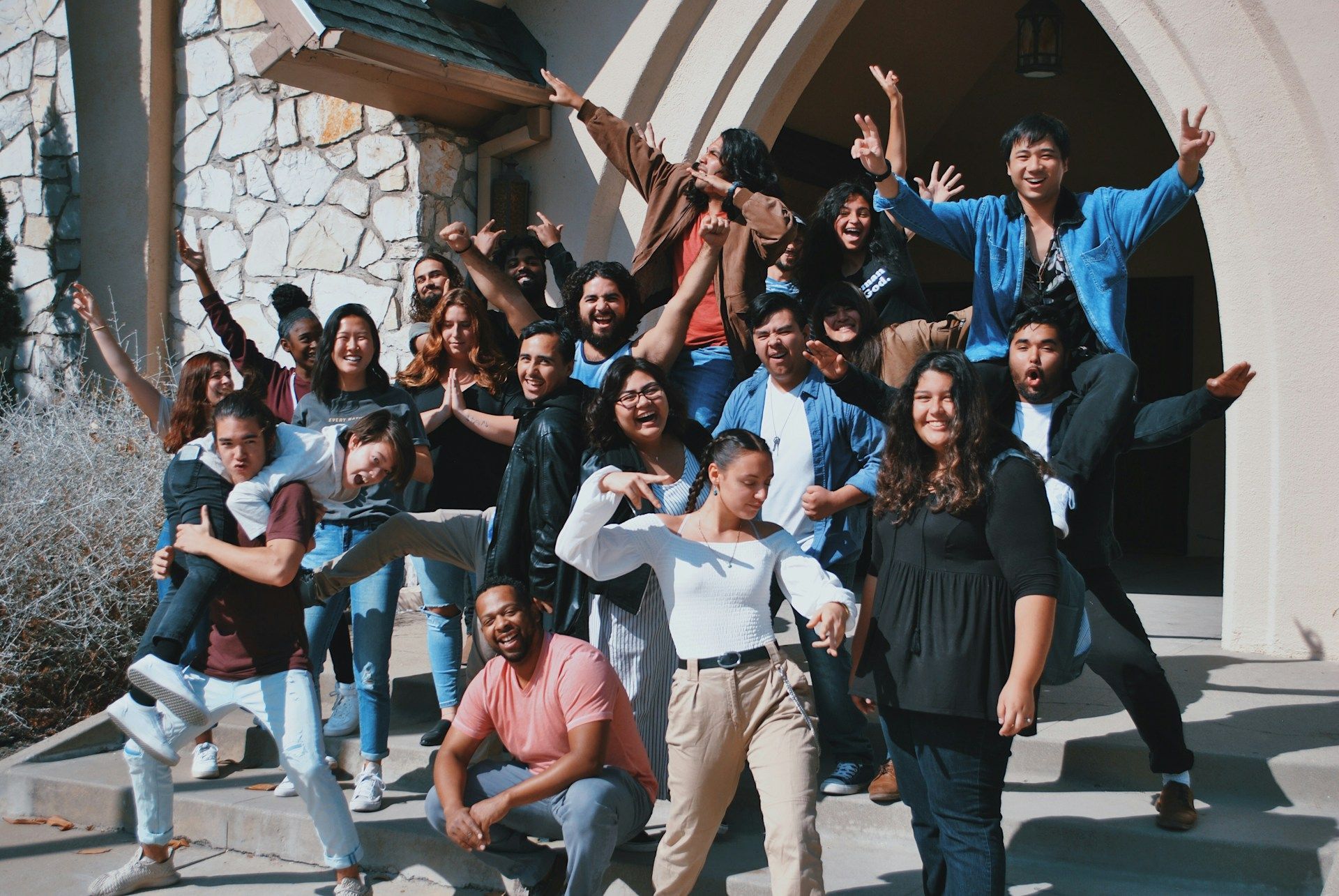Church Near Me: A Guide To Church Growth Through The Google Ad Grant and SEO | That Church Conference
So, I'm Jono. I was a youth pastor for 21 years in metro Atlanta. And so, it's nice to meet you all. Any other youth pastors in here? No? No, no, no. All right. Cool. Oh, all right. Cool. So, I had five kids and I have, well, I have five kids and a, and a wife and I don't know if you know how much youth pastors make.
It's not enough for five kids and a wife typically. So, you need to either marry rich or start a marketing agency on the side. And so, I went the marketing agency route and back in 2020 transitioned into doing this full time. And, and so here I am, you may recognize me. From the Awkward Family Photos calendar 2019.
They call me Mr. September and my mother did that to me. Awkward Family Photos got a hold of that. And then she was like, well, let's send them a picture of our whole family. And so, they, they called us and like, hey, can we put a picture of your family in the calendar? And my mom's like, yeah, that would be, that would be great.
And so, then they put it on the cover of the 2021 calendar. And then it was, it was, it was, it went so well, they came out with a card game and put us on the cover of the Greatest Hits card game. And so, you can pick this up at your local Kohl's store I'm doing a calendar signing over at my booth after, during lunch, I'll be happy to sign it, and so, so stop by.
So anyway, that's me. That's me. All right let's make this snappy because I am starving. My stomach is growling. So, we're going to talk about local search engine optimization. Sorry I have my TikTok influencer mic on here. And so, it's getting a little in my way there. Anyway, what is SEO? So, anybody familiar with SEO?
Have you guys? Okay, a few of us. I'm going to pretend like we all know nothing about it. Not to be condescending. But just because that's, it's easier that way. So local SEO, local search engine optimization, is where we focus to improve your rankings and visibility in local search results. on Google's map or local pack, okay?
And so, what I'm talking about when I say this is, this is the map pack. You've seen it, you probably didn't know it was called this, okay? And so, whenever you search, you know, church near me which by the way is the title of my book, you're welcome to pick one up. So, church near me, or best church near me, or plumber near me, or steakhouse near me, you're going to go with one of those three.
No one is ever like, hey, I wonder what the 15th best steakhouse in Atlanta is. We should check that out. 75 to 90 percent of the clicks are going to go to one of these three. All right. And so, you want to make sure, the churches we work with, we want to make sure that, that we're showing up in those top three because people that move to town and they don't have a church, people that, you know, get relocated, people who decide they're going to go back to church after not going to church forever.
They want to raise their kids in church. Whatever it is, they're going to, they're going to Google. They're, if they're not church people, they're probably not getting invited personally. So, they're hopping on Google, and they're going to find a church, and I guarantee you, they're going to go to the one, one of the ones at the top.
Now, here's why it's important. People are searching for a church. People are looking, people are on Google. I screenshotted this from Google's, it's called Keyword Planner. And Christian, let's see, church near me, that phrase was searched in Georgia on average 40, 500 times per month in 2023. And year over year, that's down in Georgia no, I'm sorry.
Year over year, that's up 22 percent in Georgia. Christian churches near me are up 60 percent over in that fourth column. If we look, another state, I think that's North Carolina, about 33, 000 searches for that same phrase, church near me on average every month this year, and then we get out of the Bible Belt whatever state that is that's shaped that way.
I think it's Wisconsin, perhaps, or Michigan, or something that I've never been to. And, even, even outside the Bible Belt, almost 10, 000 searches a month for church near me. So, people are looking for a church. People are getting on Google, they're looking for a church, and it's way up year over year. I, I get articles all the time on Instagram and Facebook, and it's like, hey, no one's going to church anymore, everybody's leaving the church, but like...
Somebody's looking, somebody's looking for church. And if we want to meet them where they are, then we better do everything we possibly can. And we better take seriously showing up at the top of Google. So, church marketing offers this solution about 19 times a week. Somebody fusses at me on Facebook, on my Facebook ads, and tells me I need to repent because churches don't need to do marketing, and that's sinful, and then they pray for me, and then I comment some smart comment back.
on Facebook, which is totally unprofessional. And so, one of my team members, they go and hide the comment. And so, pray for me, but there's a good article from, from when I was, when I was like fuming and looking like, why is church marketing biblical? If you Google that you'll, there's a tight article back from, from April of this year.
And it's, it's all about why marketing is, is biblical and it's good. And it makes the point that church marketing. offers the solution church marketing offers the solution and, and the church is sharing the gospel. The solution is Jesus. We have the answers. And so marketing kind of has a bad reputation.
That, that word is a little bit icky because so many people, there's so much clickbait and there's, you know, shady sales guys and stuff like that. So, it's got a bad reputation. As far as marketing goes, I mean, we're sharing the message of Jesus. People are online. We're going where they are. And so, and missionaries, as long as there have been missionaries, as long as there have been evangelists, they go where people are.
And where are people? They're on Google. They are on their phones. And so, we need to be making sure that, that our church, with the good news of Jesus, is the obvious choice when someone's looking. Because depending on where your church is, and depending on what the other churches are in the area, depending on depending on what city, large city you're near, the closer you get to a larger city, the weirder the list of churches gets.
And so, we want to make sure that that Bible believing, Jesus’ loving, Jesus following churches are the ones showing up at the top of the list when somebody is looking for a church. Let the message of Christ. Colossians says this Colossians 3, Paul says, Let the message of Christ dwell among you richly.
As you teach and admonish one another with all the wisdom through psalms, hymns, and songs from the Spirit, singing to God with gratitude in your hearts. And whatever you do, whether in word or deed, do it all in the name of the Lord Jesus, giving thanks to God. the father through him. And, and so we're doing this for the sake of the gospel.
We are marketing in Jesus’ name. We take this seriously and this is a big deal. I want to show you this is, this is kind of a heat map, a grid ranking report for a church north side assembly in Jackson, Tennessee for the phrase church near me. Is anybody from north side assembly in Jackson, Tennessee?
Okay, good. Cause we're going to kind of pick on them a little bit. So, their church is in the middle. And if you search church near me while you were like in their parking lot, they're going to be number one. All these, all these little points are five miles apart. So, if you get in your car and drive five miles in any direction, they automatically jump out of the top.
They're not even in the top 20. Now, the thing about it is. These guys are doing everything right. I, I met them in a Facebook group, and I started giving them advice for free, and, and no one ever takes my advice. Either people ignore me, or they're just like, here, just do it for me. This guy, these guys, they did it.
They did everything, and, and they were like, hey, Jono, you're a liar cause we're doing everything you said, and we're still number 46. And that's terrible. So, I was like, alright, fine, I'll, I'll start working on it for free. And so, got to digging and we're going to use them as an example here in a minute.
I'm going to show you some things that, and so what I want to do in the next four minutes is, is give you like four or five things that you can literally go do right now. Literally go do right now on your own without paying anybody. You can go do this and make some tweaks to your Google business profile. And, and it'll, it'll make some Oh, okay, cool, cool. So, here's what you need to do.
What do we need to do? We need to optimize the heck out of your Google business profile. Sorry for the bad language, but you need to optimize the heck. Out of your Google business profile. Have you ever seen do you know what I'm talking about when I talk about Google business profile? But by show of hands who's ever like heard the phrase Google business profile, okay?
All right, so like 40 percent of us your Google business profile. This lives in Google Maps This are your profile on Google when you show up on Google like for church near me Where your reviews are, and the pictures are, and your logo is all that on Google. That is your Google business profile Okay, and you need to make sure that you've got access to it.
So, if you're in charge of that, if you're in charge of Google at your church and you're not sure if you have access to it, you need to, you need to go figure that out. If, if you're not sure if the person who oversees it has access to it, you want to go, you want to take some notes and go tell them, hey, you need to make sure.
And the way you know, it's got to be connected to a Google account. If you go to your church, you search your church on Google, on Google Maps, maps. google. com, this is what the results will show. It'll say your business on Google. If it doesn't, then you know you don't have the access you need. So, you need to figure that out.
And then once you get in here, there's all kinds of, there's lots of things you can do. to start tweaking this so that you'll start climbing up from number 46 to number 1, 2, or 3 and be the obvious choice in your community when somebody is looking for a new church. It is not going to happen overnight.
Like, we get this all the time, like, hey you think you can make us number one on Google over the weekend, you know, just do a few things, like, we'll pay you, we'll pay you 50 bucks. It's like, no. It's going to take time. When my wife and I first got married, we joined a gym, dumbest mistake of our life. And they gave us like a free personal training like two free personal training sessions.
And we show up, we get the personal training sessions, the guy's first name was just the letter D. Like, I should have known then. His muscles had muscles, he didn't have a neck, he was just one of the Nordic looking dudes. And I’m used to like working out on the pink weights. And, you know, he's giving me, he, I, I was so sore for three days, I called in sick to work.
I had, I was, to drink I had three straws attached. And I learned some very valuable things about myself. One, I don't really care about muscles. 2. Growth takes time. It's a lot of work. These guys that have big muscles, they're drinking eggs for breakfast and getting up at 4 and I'm just, that's just not, that's not going to be me.
SEO, this is going to take some time. This is going to, if you will carve out like 30 minutes a week, you're going to make some gains with this, but it's, it's not going to happen overnight. So, the map pack ranking factors. These are, I'm going to give you the top 10 things that most SEO nerds agree make the biggest difference.
Okay? A few of them are going to be irrelevant. We'll skip those. But the number one primary Google business profile category you get to select a category and you can select multiple categories Most people don't ever do anything with it They let Google choose for them and they only choose one and then they ignore it Okay, so in the example of this is one of our client’s linear point churches They're like right down the road.
You probably pass them on the way here If you look at their categories, when you go and edit business information, business category down there, it says church is primary. But then there's all these other categories. You don't get to make these up. Google has already prepopulated them, but you start searching in the word, or typing in the word church, they'll start popping up.
And you can select as many secondary categories as apply. So, gospel church, Christian church, place of worship, all those, non-denominational church community center is an option. So, if you've got like a food pantry or something, you offer counseling at your church, whatever, A community center would be a good one.
But you want to make... Church, the, the primary category and let's, let's go back to Northside Assembly again. Here's an example. Okay, so Northside Assembly in Jackson, Tennessee, they're not even in the top 20. The church is in the top 20. If you look at the top three and look at their primary category, what is it?
It's church. Northside Assembly had made, logically, this was not a dumb thing, they made their primary category. Assemblies of God Church because they're Assemblies of God Church. But you would have to go on Google and be specifically looking for an Assemblies of God Church to clue Google in. As much as they spy on us and as much as they know, it's still a dumb robot, okay?
And so, you would have to be looking for an Assemblies of God Church for Google to pick up on the fact that you want to see Northside. So, what I told them is, we've got to change the primary category. If you look at these top three... Yeah, it's all, it's all church, church, church. So that's a huge deal. The second one, the other thing that they were missing out on is keywords in the Google business profile title, which shouldn’t, that, that for most churches, the word church, which is the big keyword for, for most of you, the word church is in your name, but let's, let's go back to them.
How were they listed? Northside Assembly of God. Okay, and they didn't have the keyword church in their name. Now, the interesting thing is that number 1, 2, and 3, neither do they have the word church in their name. So that, what that does not mean is that I'm not lying to you. Having the keyword is a big deal.
But the takeaway there is that there are some things that will help you, but it takes a lot of, getting a lot of those things right. to build momentum, but one or two things wrong can really mess you up. So, it's, it's not any one piece of the pie that's a silver bullet. You've got to be getting all these things right.
The other thing is the proximity of address to the point of search. Just meaning, the further you go... The less likely you are to show up. That's why if your church is in Atlanta, you're not going to show up if someone is sitting in their car in Tampa searching church near me, because you're not near Tampa.
Now, you can do better than Northside. You can do better than this. You can do better than like the parking lot. But I don't know, some of the other SEO guys in here, I think we could probably all get together and argue about it. Most people kind of land on, you're probably not going much past 25 miles, which, I don't know that anybody past, is going to drive more than 25 miles to your church.
For the most part anyway, but we can shoot for about 25 miles and what we want to see is these red dots start to turn green number four physical address in the city of search That's a big deal. You got to have a physical address meaning you can't verify a post office box This this may affect you if your church meets in a school or a theater and it's not you know you don't have A physical address that you can claim as your own that could cause a problem.
This is this is going to be tricky I’ve even for my own business. I don’t know. I rented a co working space that I don't ever go to Just to have an address a physical address in a city that I want to rank in, so I pay them a couple hundred bucks A month for a co working space that I never go to so that I have a verified Google address and if Google is watching I was just kidding.
I would never do that because that's against policy.
Number five removal of spam listings through spam fighting that doesn't apply to you But like if you're if any of your friends own a plumbing business You probably got plumbers who are doing fake profiles in cities that they don't have a business in Because they have service area and they want to show up in cities that they'll drive to, but they don't have an office there.
So, what guys like me do is you go report them and tell Google, hey, they're lying, and Google will take them down. That's, that's not going to affect the church. High numerical Google rating score. You want like a 4. 6 minimum. of your, of your Google score. Okay. I'm not, I'm not eating anywhere with a 4.
2. I don't know about you. I'm not eating anywhere with a 4. 2. So same thing, like everybody's going to get a negative review here and there, but if people will give you some grace, so you probably don't have to have a 5. 0, but like somewhere between 4. 6 and five. So, you've got to get a system in place of asking people in your church.
to leave reviews, which may feel kind of icky. I get it. That's probably the biggest thing I push up against with pastors is you guys have got to ask for reviews and they feel weird about it, but you just got to sell your people on, look, people are on Google. This is how we reach more people. If you're too lazy to invite your neighbors to church, at least you can do is leave us a Google review.
It's not that hard. Number seven, additional Google business profile categories like I was showing you a minute ago with Linear Point, we've got Gospel Church, Christian Church. So go back in there. I guarantee you, you've only got your primary category set unless, unless like you're awesome. And if you have more than one category set, I would like to talk to you about employment opportunities at Faithworks Marketing because that's pretty, that's cool.
No one does that. So go set some additional categories. Quantity of Google reviews, like we just said. So, you need a high score and then you need a lot. But here's what you don't want to do. You don't want to make a big push and get 15 reviews in one day and then not mention it again for six months.
Google doesn't like bursts. They want slow trickles of, of natural feeling reviews. They're not that, I mean they're dumb, but they're not that dumb. They're going to catch on if occasionally, you just get a bunch of reviews. They're going to know you're soliciting them and soliciting reviews.
Offering incentives for reviews is a big no, and if they ever catch on, if they ever figure that out, they'll, they'll penalize you, so you want reviews, so, so even if you had like a QR code on the, the announcement screens, the, the pre service, you know, role, just where people can leave they can scan the QR code, it'll throw up Google Maps on their phone, they can leave you a review, that, you know, something as simple as that, just keeping it in front of people.
Number nine, a verified Google business profile. Going back to going in there and claiming your Google business profile and then Google will verify it. They used to send a postcard with a five-digit code and then you would go in and plug that in. Now a lot of times you must hop on a video and like show the guy this is our church and it's real and here's our mailbox with our address.
They really tightened up on that to cut down on fake reviews. But if you know, here, but here, here's something interesting. And here's what ticked us off at North about Northside. Those X's signify unverified Google business profiles. So, guess what? Number one, Notre Dame D. Jackson. It, they're, they haven't even verified their Google business profile, but they've been around like 900 years.
So that's a big deal. Northside Assembly, they verified it. You've got seven churches in the top ten that have not even verified their Google business profile. So again, this doesn't mean that I'm lying, and that verifying is not important, but the takeaway here is that a couple little things can really mess you up and it takes a lot of things together to help you make sense.
All right. All right. I'm going to land this plane. I know y'all are starving, right? We are good. We good like just a couple more minutes. Oh Really? All right. Well, let's just keep on talking. All right, we are Least this side of the room you guys Okay, number 10. Proximity of address to city center. Not much you can do about this, alright, unless you're going to unless you're going to pick it up and just like, mm, plop your church down in the middle of the city.
Not a whole lot you can do by that, about that, but if your church does happen to be near the city center, you're in good shape. That's going to help you out. Here's a few other things that you could practically do. One, go add some photos to your profile. Get your social, whoever's posting social media, you need to get them, download the Google Maps app, get them logged into the Google Business Profile.
Every social media post, unless it's bad, unless it's dumb, they need to go post it to your Google Business Profile. Probably one a week is enough, but you can also create events on your Google Business Profile. If you ever search, like, concerts near me, And, and like concerts start popping up on Google.
You're not even going to the Ticketmaster website. Those are because people have gone into their Google Business Profile and created events on Google. So, you could go in, like the churches we work with, every Monday we create an event for next Sunday's worship service. And so, every week there is a Sunday morning worship service event on Google.
Here's a suggestion I'd make. Change your church hours to, your open hours to 24 7. A lot of churches have their office hours or their, their service times, but here's what we know. Google prioritizes open businesses. If you're searching for best place to eat lunch, you do not care what restaurants are closed around you.
And Google knows that. So, if I'm searching on Saturday night, I decide I'm going to take my family to church in the morning, and I'm searching for a church, Google's going to prioritize open businesses. And the truth is, you're off, you don't, no one really needs to know your office hours, because anybody who's going to come meet with you, is probably going to set an appointment, everybody else is a salesperson, potentially.
So, I, I would just set it to 24 7, and see, see what happens. Other thing you need to do is speed up your website. Which is some of the problem with the do-it-yourself website builders that's why, you know, you probably want to. Hire a company that like does custom websites because you just you know if you've got like a Squarespace website Which they're fine.
They look good. But if there's ever a speed problem there's just not a whole lot you can do to fix that and of the three problems with Northside one was, they didn't have the word church in their name Two was something else. I can't remember quick. Whatever I said Oh their category and three was there's their website speed was just awful, and we couldn't that they weren't speeding it up and you can go to genetrix.
com plug in your web address, and they'll tell you whether you pass or fail how fast your website is Another other thing, change the header. And, and so this big text at the top of your website that we usually kind of make cutesy is one of the primary ways that Google knows what your website is about.
So, while BU and belong is nice and warm, makes me feel good, it doesn't tell Google this, this could be a life insurance website for all Google knows. Okay? And, and so we want to use that, that big header. To tell Google what the church is that it's a church and preferably put the city in there Let them know where the church is.
Okay, so last thing Speed things up. So, you're doing the SEO stuff. It's going to take time. I'm not going to happen overnight You want to speed things up you start running some Google Ads? Okay, Google will give a nonprofit a 501c3 10, 000 a month in ad credit. It's an in-kind grant. It's not cash. I get a call every week from a pastor Hey, we need a church van.
Can you get us that Google grant? Like, no, you can't buy church vans. You can't re roof the church. You're not getting a piano. It is for Google ads, okay? If you're interested in it, you can go to google. com slash grants. It says right there, under the arrow, it'll, they'll give you 10, 000. If you're interested, like, okay, how do I apply?
Cause I don't have time to go through all the steps right now. We've got a, we've got an If you go to faithworksmarketing. com, we've got a grant guide on there, or you can just Google ad grant for churches We're the right under Google's result. We'll show up there and It’ll take you through the steps of getting it.
But once you've got the grant, it's indefinite There's some guidelines you've got to keep you've got to do a good job with it It's not like sit it and forget it if somebody in your church is going to try to manage it, they need to throw themselves into it. They need to watch a lot of YouTube videos.
They need to figure it out and get on it, but you need to get creative with it. This is what a Google ad looks like. So, you can, you know, this church, we ran some ads just about humility. And so, then we built a sermon landing page that's got his sermon on humility. And we, we took the transcript had it transcribed by AI.
Then we had AI condense it. Then we copied and pasted it on that page. So, you've got some keywords in there. Now we're running ads about humility. Humility is a high volume. Keyword. And so, we're running people to that page and then inviting them to plan a visit once they're there, you can do things like branded campaigns.
This is just using your key, use your church name as the keyword so that if your SEO is not working yet, you can jump, you know, cut the front of the line. Another thing you do special event campaigns. You want to run ads for your special events in 2022 every year. Google does a year in review of search terms.
And if you use the modifier near me, these are the top 10 searches. in 2022 and they were gas prices at, and then it was COVID voting, voting, COVID, COVID, Easter egg hunt, which was only searched for like a month. So, in the top 10 searches in the entire year, Easter egg hunt got enough searches because that's huge.
So, if you do an Easter egg hunt at your church, you need to build a page that's all about the Easter egg hunt. Not just an event on your calendar. You need to build a page that's all about the Easter Egg Hunt. Then, go budget some money for some ads and, and run the heck out of some ads to your, to your Easter Egg Hunt.
Because there are tons and tons of mamas in your area looking for something free to do with their babies. And take their babies to an Easter Egg Hunt. So, that, that is, like, don't miss out on that. Another thing you do, ministry focused campaigns. You know, your kid’s ministry, celebrate recovery, stuff like that.
And then lastly and I stole this idea from the guys that reached the loss. You should go to their booth. Good, good people. They do, they, they do a really good job with this Google grant. And they do a cool thing with felt need content. They, they have some really good content that they put they, they put out and then connect it to your website and then run Google ads about like anxiety and how to manage your money from a biblical perspective.
And there's lots of these, like, like Andrew over at Mission, you got Justin over here. There are tons of people in this room who know the Google grant. And we're all good at it. It just kind of comes down to who's got the best beard, you know, then you can make your decision and decide who you want to, who you want to work with.
And, and so that's some great stuff you can do with the felt need or with, with the Google grant and it's out there and yeah, so cool. I'm sorry I went over, but I hope that was helpful. Thank you, guys, so much for not getting up and leaving and going and eating. So.












